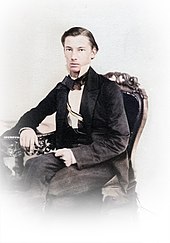Leopold Witte (9 June 1836, in Halle an der Saale – 2 December 1921) was a German Protestant theologian and educator. He was the son of Dante scholar Karl Witte (1800–1883).[1]

From 1853 to 1857 he studied Protestant theology at the universities of Halle and Heidelberg, and afterwards worked as a tutor at the Prussian Embassy in Rome. In 1861 he was ordained as a minister in Berlin, and he subsequently served as a pastor in the town of Cöthen, near Eberswalde. From 1873 to 1879 he lived in the United States, and following his return to Germany, served as a professor and superintendent at Schulpforta (1879–1900). In 1888 he received an honorary doctorate in theology from the University of Greifswald.[2][3]
Published works
editHe was the author of a well-received biography on theologian August Tholuck, titled Das Leben d. Friedrich August Gottreu Tholuck's, (2 volumes, 1884–86). His treatise on humanist Pietro Carnesecchi and the Italian Inquisition, Pietro Carnesecchi : ein Bild aus der italienischen Märtyrergeschichte (1883),[4] was translated into English and published as: A glance at the Italian Inquisition: a sketch of Pietro Carnesecchi: his trial before the supreme court of the papal inquisition in Rome, and his martyrdom in 1566 (John Thomas Betts, 1885). His other principal works include:
- Friedrich der Grosse und die Jesuiten, 1892 – Frederick the Great and the Jesuits.
- Die erneuerung der Schlosskirche zu Wittenberg : eine that evangelischen Bekenntnisses, 1894 – The renewal of the All Saints' Church, Wittenberg.
- Richard Rothe über Jesus als Wundertäter, 1907 – Richard Rothe on Jesus as a miracle worker.[5]
References
edit- ^ ADB:Witte, Karl at Allgemeine Deutsche Biographie
- ^ Pfarrerbuch der Kirchenprovinz Sachsen - Evangelische Verlagsanstalt publisher
- ^ Lexikon für Theologie und Kirchenwesen: Lehre, Geschichte und Kultus ... by Heinrich Julius Holtzmann, Richard Otto Zöpffel
- ^ Pietro Carnesecchi. Ein Bild Aus Der Italienischen Märtyrergeschichte Google Books
- ^ HathiTrust Digital Library (published works)